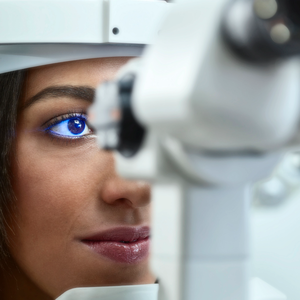Diabetic Retinopathy Services
Everyone with diabetes is at risk for eye diseases such as diabetic retinopathy (including macular edema). Four in 10 people with diabetes have diabetic retinopathy. Some people don't realize the harm until they completely lose their vison because it happens slowly over time.
In 2022, Diabetic Retinopathy screening machines were installed in 30 clinics in the Bellin Health service area. This was made possible by funding from DKBmed and Digital Diagnostics. The installation of these machines will improve access and diagnosis of DR for Type 2 Diabetes patients, potentially preventing blindness.
Screenings are performed right in your primary care clinic. Consult with your provider to schedule a diabetic retinopathy screening.
What Causes Diabetic Retinopathy
(including macular edema)?
Diabetic retinopathy (including macular edema) is a problem caused by diabetes. It damages blood vessels in the back of the eye due to high blood sugar or fluid in the macula. This damage causes the blood vessels to swell or leak.
As a result, the delivery of blood to the retina is affected. They can also close off entirely, and sometimes new blood vessels form. Most people with diabetes will develop some form of diabetic eye disease.
How Does It Work?

Screening for diabetic retinopathy can catch the problem while it is still treatable. Screening is quick, simple, and painless. It can save your vision.
- A camera is used to take pictures of the back of the eyes.
- The pictures are securely sent to IDx-DR for analysis which uses artificial intelligence to find diabetic retinopathy (including macular edema) in the pictures.
- In minimal time, IDx-DR will produce a report that says if you have diabetic retinopathy, which may include macular edema.
The entire diabetic eye exam generally takes a few minutes. In some circumstances, dilation may be required. Those diabetic eye exams may take a little bit longer.
When Should You Get Tested?
- Type 1 Diabetes – Within 5 years of your diabetes diagnosis
- Type 2 Diabetes – At the time of diabetes diagnosis, then every 12 months
Diabetic retinopathy can affect both type 1 and type 2 diabetics, regardless of how well they manage their diabetes.
Regular eye screenings are important for people with diabetes, even if they haven't noticed any changes in their vision. IDx-DR is not a full eye exam. However, it can identify diabetic retinopathy and macular edema. Based on your diagnosis, we may recommend referring you to an eye care specialist.
An eye specialist needs to evaluate these conditions. Patients who have blurry vision or other symptoms of vision loss should see an eye doctor right away.
